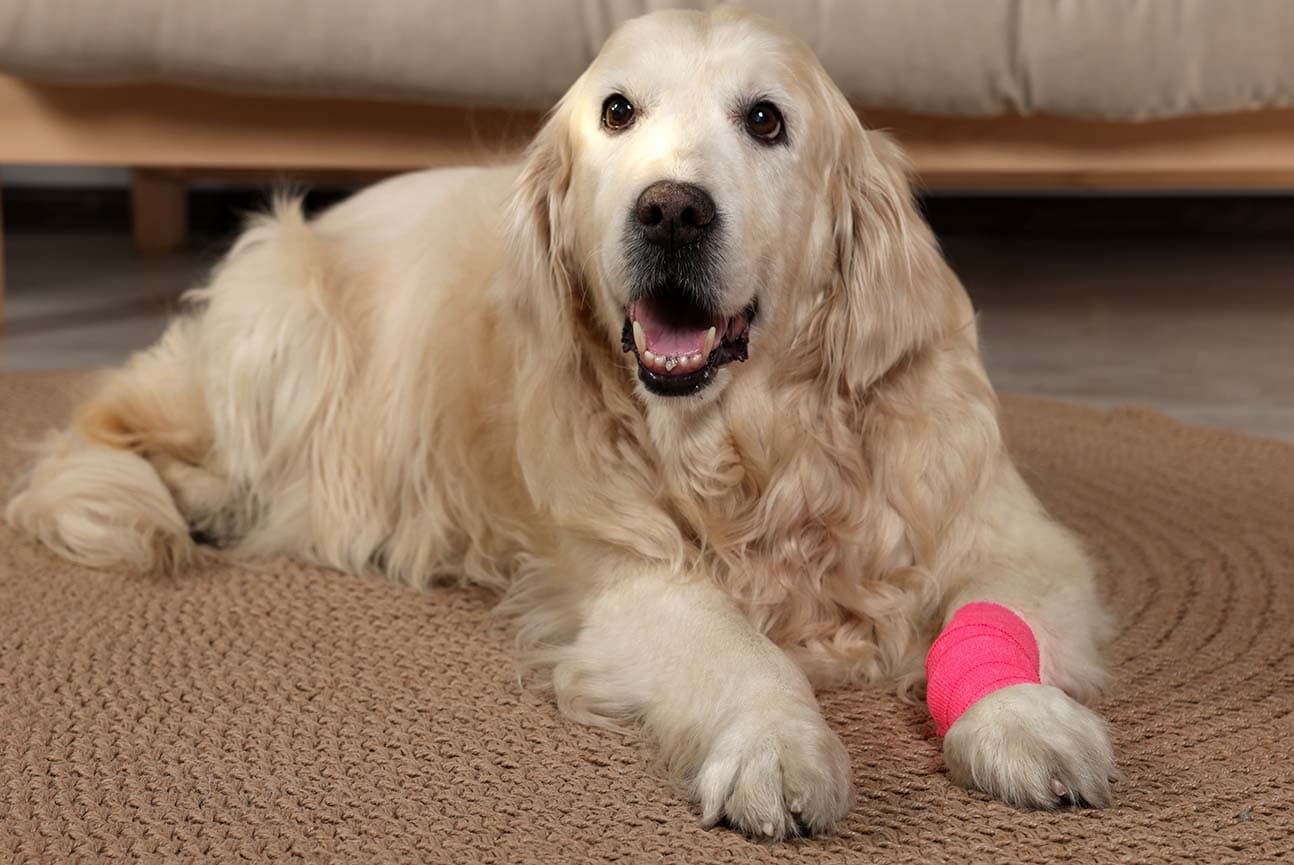Reviewed by Dr. Laura Castillo
Updated on 06/11/2025
Reading time 4 min.
Overview
Severity: Low
Life stage: All
Wounds in dogs are common and range from minor scratches to serious injuries needing surgery. While small cuts or grazes can sometimes be managed at home, deeper wounds, bites, and burns require immediate veterinary attention to prevent complications. Quick assessment and timely care are vital for healing and infection control.
In Dubai, the warm climate, sandy environment, and urban hazards such as hot pavement and sharp construction materials increase risks for dogs. Understanding these challenges and seeking prompt veterinary support can greatly improve recovery outcomes.
Most common causes of wounds in dogs
Bite wounds
- Encounters with other dogs, cats or occasionally wildlife
- Range from small puncture wounds to extensive lacerations
- Dog bite wounds often cause more internal tissue damage than is immediately apparent from the surface
- In Dubai’s dog parks and shared outdoor spaces, social conflicts between unfamiliar dogs can lead to bite injuries
Torn nails
- Commonly occur during energetic play or running on hard surfaces
- Can result from overgrown nails catching on furniture, carpeting or outdoor surfaces
- Sometimes caused by trimming nails too short during grooming
Cuts, tears and grazes
- Lacerations occur from contact with sharp objects such as glass, metal fragments or broken tiles
- Grazes (abrasions) affect only the superficial skin layer and typically result from contact with rough surfaces
- Can be self-inflicted through excessive scratching or rubbing
Pressure wounds
- Develop from prolonged pressure on specific areas of skin
- Occur when dogs remain in one position for extended periods
- Can result from incorrectly-fitted or excessively-tight bandages
- Can be particularly challenging to treat and often heal slowly
When should I worry about my dog’s wound?
Seek immediate emergency veterinary care if your dog has:
- Penetrating wounds involving the chest or abdominal cavities
- Suspected snake bites (though uncommon in urban Dubai)
- Excessive bleeding or any bleeding that continues beyond 10 minutes
- Deep wounds where the underlying bone is visible
- Any eye injuries or trauma
- Clear signs of wound infection: increasing swelling, discharge, foul odour, heat
Contact your veterinary clinic promptly for guidance if your dog sustains minor cuts, animal bites, torn nails, or if you need advice on proper wound care and ways to prevent infection.
What to do if your dog has a wound
Serious wounds
- Keep your dog as calm and still as possible to minimise further injury
- Apply firm, direct pressure to heavily bleeding wounds, using a clean cloth or towel
- For burn injuries, rinse thoroughly with cool (not ice-cold) water and remove any chemical substances
- Transport to your nearest veterinary clinic immediately for professional assessment
- Exercise caution, as pain and stress may cause even gentle dogs to bite or scratch defensively
Other wounds (cuts, grazes, bite injuries, torn nails)
- Apply gentle, sustained pressure with a clean cloth for up to 10 minutes if bleeding is present
- Clean the affected area with saline solution (1 teaspoon salt dissolved in 500ml cooled, boiled water) when possible
- Carefully remove any visible small foreign objects using clean tweezers
- Prevent licking, biting or scratching of the injured area
- Arrange a veterinary examination to determine whether additional treatment is necessary
Given Dubai’s dusty, sandy environment, thorough wound cleaning is particularly important to prevent contamination and subsequent infection.
Prevention of wounds in dogs
Unfortunately, most wounds occur unexpectedly and cannot be entirely prevented. However, several strategies can reduce risk:
- Trim nails regularly to prevent overgrowth and snagging
- Secure balconies and ensure safe outdoor spaces in high-rise accommodation
- Remove or secure sharp objects and potentially hazardous materials from your dog’s environment
- Supervise interactions with unfamiliar dogs in parks and social settings
- Never attempt to apply bandages at home without veterinary guidance
- Regularly reposition dogs who are resting more than usual due to illness
- Keep your dog to a healthy weight and body condition through balanced nutrition and appropriate exercise
- Keep skin clean and thoroughly dry, especially important in Dubai’s humid conditions
- Provide elderly and debilitated dogs (especially large breeds) with soft, supportive bedding
Diagnosis of wounds in dogs
Most traumatic wounds don’t require extensive diagnostic tests initially. However, your veterinarian may recommend additional tests for severe, infected or unusually slow-healing wounds:
- Bacterial culture and antibiotic sensitivity testing through wound swabs
- Skin biopsy if healing patterns appear abnormal
- Comprehensive blood and urine analysis to assess overall health status
- Imaging (x-ray or ultrasound) for assessment of deeper injuries
- Advanced diagnostics (CT, MRI) for complex cases
Signs of infection
Monitor carefully for these concerning developments:
- Progressive swelling, increased redness or heat around the wound
- Discharge, particularly if it is discoloured or has a foul smell
- Lethargy or loss of appetite
Black or dead-looking skin around the wound is an emergency and needs immediate veterinary care.
How to treat your dog’s wounds at home
All wounds should be professionally assessed, particularly if large, deep, or showing any signs of infection. For minor injuries, good home care is appropriate in the first instance.
Keep wounds clean and dry
- Use saline solution for gentle cleaning: make this by dissolving 1 teaspoon salt in 500ml cooled, boiled water
- Clean carefully 1-2 times daily during the initial few days
- Ensure gentle, but thorough drying after cleaning. Dubai’s humidity makes this step especially important
Prevent self-trauma
- Use protective Elizabethan collars (cone-shaped) or comfortable inflatable alternatives
- Consider medical pet shirts or protective clothing for body wounds
- Restrict exercise and activity levels until healing is complete
Support optimal healing
- Apply only veterinarian-recommended topical treatments such as medical-grade Manuka honey or prescribed antibacterial preparations
- Monitor progress daily and note any changes
What to expect with wound healing
Normal wound healing progresses through three distinct phases:
- Inflammation and cleaning (first few days): Mild swelling occurs as the body removes dead cells and debris
- Repair phase (typically 5-14 days): New tissue develops to close any gaps in the skin
- Maturation phase (weeks to months): Tissue strengthens and remodels for optimal function
Most uncomplicated wounds heal completely within 5-14 days. Dubai’s climate may slightly extend healing times, due to increased bacterial exposure and high humidity.
Factors that can significantly delay healing include:
- Underlying medical conditions, such as diabetes or kidney disease
- Poor diet and nutritional status
- Certain medications
- Environmental factors: excessive heat, wound contamination
How vets treat wounds in dogs
Professional treatment varies considerably, depending on the wound’s underlying cause, size, location and depth.
Mild wounds typically require:
- Careful hair clipping around the affected region
- Thorough professional cleaning and disinfection
- Complete removal of any foreign material
- Nail trimming if damaged during injury
- Appropriate bandaging techniques
- Prescribed topical medications
- Systemic antibiotics or pain management as required
Serious wounds may necessitate:
- Emergency stabilisation and control of bleeding
- Surgical repair using sutures (stitches), staples, or advanced closure techniques
- Abscess drainage procedures
- Removal of dead or infected tissue
- Placement of surgical drains,
- Tissue flaps or grafts to cover or repair larger wounds
- Laser therapy for enhanced healing
- Specialised treatments, such as antivenom administration
- An operation: repairing broken bones or cut tendons
- Long-term bandage management and medication
Are some dogs at greater risk of getting wounds than others?
All dogs can sustain wounds, but certain factors increase individual risk:
- Young, energetic dogs: Higher likelihood of cuts, grazes, and tears due to adventurous behaviour and active lifestyles
- Dogs with regular outdoor access: Increased exposure to environmental hazards and potential conflicts
- Elderly, overweight or inactive dogs: Greater susceptibility to pressure wounds and slower healing
- Dogs with underlying health conditions: Weakened immune systems or problems with blood circulation
In Dubai, where apartment living is the norm, dogs may face increased specific risks. These include balcony-related injuries, accidents with glass surfaces, and potential conflicts in crowded dog parks or shared outdoor spaces.
Worried about your dog’s wound or injury? Book a checkup or emergency appointment today at Modern Vet Hospital in Dubai. Their experienced veterinary team provides expert wound assessment, emergency treatment, and ongoing care to support your dog’s recovery. From minor cuts to urgent injuries, Modern Vet Hospital is your trusted veterinary clinic in Dubai for compassionate, thorough care for your four-legged friend.
Share this, choose your platform!
Reviewed by
Dr. Laura Castillo
DVM
Dr. Laura was born and raised in México. As far back as she can remember, she only had one dream and it was a dream of one day becoming a veterinarian.


